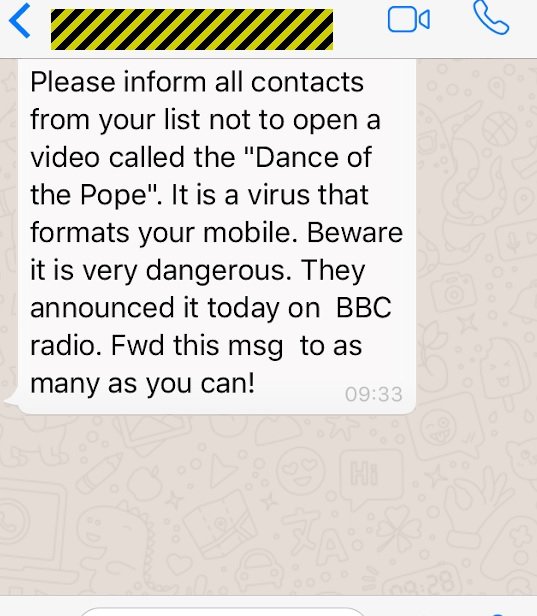Since the use of WhatsApp became massive, users have been exposed to multiple scam attempts, cyber security awareness specialists assure. One of the most popular variants is the “Martinelli scam”, which speaks of an alleged video that will be sent to all users of the messaging platform, and that would have the ability to hack a device.
The Martinelli scam was part of the widely popular campaign known as WhatsApp Gold, a supposedly improved version of the app, used by government officials, athletes and celebrities, which is actually a variant of mobile malware.
The resurgence of the Martinelli variable was recently reported, albeit with some changes. The message assures WhatsApp users that the next day will be sent in bulk a video capable of formatting the devices of the victims, although the subject of the alleged video changed this time.
According to the cyber security awareness specialists, the supposed video is now called “Dance of the Pope”, and the following message is sent to users: “Please inform all your contacts so that they do not open a video called Dance of the Pope, as this is a virus that formats your mobile; send this message to as many users as you can.”

As if that weren’t enough, the chain messages alluding to Martinelli’s video have not stopped appearing. Cyber security awareness specialists suggest that this trend could be related to the growth in popularity of a footballer named Martinelli recently joined the roster of London club Arsenal.
The goals of the threat actors behind these fraudulent campaigns are somewhat ambiguous. Even so, specialists say that in fact it is possible to compromise a smartphone through a video loaded with malware, taking advantage of unfixed bugs in a media player or on a messaging platform.
On the other hand, the International Institute of Cyber Security (IICS) mentions that, while these attacks are possible in theory, the possibility of them occurring in practice is remote, as the work of constant updating these platforms prevents the most security risks.
These kinds of messages will continue to appear, so the main recommendation is to ignore, as well as verify that your applications are always updated.

He is a well-known expert in mobile security and malware analysis. He studied Computer Science at NYU and started working as a cyber security analyst in 2003. He is actively working as an anti-malware expert. He also worked for security companies like Kaspersky Lab. His everyday job includes researching about new malware and cyber security incidents. Also he has deep level of knowledge in mobile security and mobile vulnerabilities.











